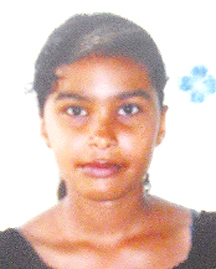The failure to pursue a medical solution to Sangeeta Persaud’s illness was irresponsible, the Guyana Human Rights Association (GHRA) said yesterday, while urging a “prompt and vigourous” medical investigation of the fatal case.

In a strongly-worded statement, the GHRA said the ongoing Health Ministry probe of the case of the Canal Number Two girl, whom pastors of the Christ Ambassadors Church tried to rid of a demon, should not be a “pacification device” to dissolve indignation. “The GHRA calls on the Ministry of Health to adopt a less complacent attitude to the cause of death of Sangeeta Persaud, both to deter the search for spiritual explanations for medical phenomena and to re-assure the distressed community,” the group said. It noted that a central medical question is why the girl’s funeral was allowed to take place a day after the pathologist recorded an autopsy verdict of “inconclusive.” According to the group, “Medical determination of “an inconclusive” death on the basis of a routine autopsy only fuels lurid and melodramatic explanations, especially when they are promptly followed by burial.”
On Tuesday, Health Minister Dr Leslie Ramsammy told Stabroek News that an investigation into the case is ongoing. Although he acknowledged that all the relevant facts are not yet known, he was certain that the child was in need of urgent medical care and said not taking her to the hospital immediately after she took ill was a “huge mistake.” The minister would not elaborate on the nature of the probe and what it intends to unearth but he said the case is being monitored.
Chaitranie Ramotar, the girl’s grandmother, has maintained that the girl was subjected to a physical ritual, which included prodding, squeezing and palming, on March 28, hours before she died in hospital. Pastor Ewert Cummings and Pastor Gulab have denied there was any beatings during the ‘exorcism,’ which they have described as being prayers. The girl’s mother, who was also present at the ceremony, has also denied any physical treatment.
The GHRA statement said neither the medical nor religious/social responses to the girl’s death have been acceptable. It was specifically critical of the intervention of the Ethnic Relations Commission (ERC) in the case, saying it illustrated “all the weaknesses of religious leaders exercising secular functions.” ERC Chairman Juan Edghill last week hosted a news briefing with the pastors who performed the excorcism, saying that it was necessary to address the vilification of the religious group in the community and to correct inaccuracies reported in the media.
The problems generated by the behaviour of the pastors involved were compounded by the conflict of interest, which marred the intervention of Edghill, the GHRA contended. Noting Edghill’s posts as Chairman of the ERC and the leading figure in evangelical Christianity in Guyana, it said he should have stepped aside and allowed other members of the Commission to handle the matter. “The upshot of this less than impartial intervention left the situation more rather than less conflicted,” it added.
According to the group, the evangelical tendency within the Christian churches “will hopefully accept” that the failure to pursue a medical solution to the girl’s illness “was irresponsible.” It added that practices which are indistinguishable from ‘obeah’ should not be defended as “exorcism.” Further, it pointed out that during the past year, there have been two other incidents-in Moruca and at the Multilateral School in La Penitence, in which ‘exorcism’ has been the principal response to hysterical behaviour by young girls. “No satisfactory medical clarification has been provided for these incidents, thereby encouraging sensational and occult explanations,” it noted, while expressing hope that the girl’s tragic death will put a stop “to this flirting with spirits” before the exhaustion of medical remedies. It urged the leadership of faith-based organisations to discourage the view that the label of “religion” can be invoked to justify extreme behaviour. In particular, evangelical Christians, it added, should recognise the sensitivities inherent in a multi-faith society and to desist from activities which are perceived as insulting in non-Christian communities. Further, it said there is need to devise an initiative that will bring closure to the religious tension generated in the Canal Polder by the case.
The GHRA said it believed the “confusing circumstances” surrounding the girl’s death should encourage a review by religious leadership of all persuasions of the role they are encouraged to adopt in the society.
The voices of independent religious organisations and institutions have been replaced in recent decades by those of individual religious leaders, playing quasi-political roles, the group charged, saying that the confusion of roles is aggravated by the extent to which religious activity is inter-twined and funded from public sources.




